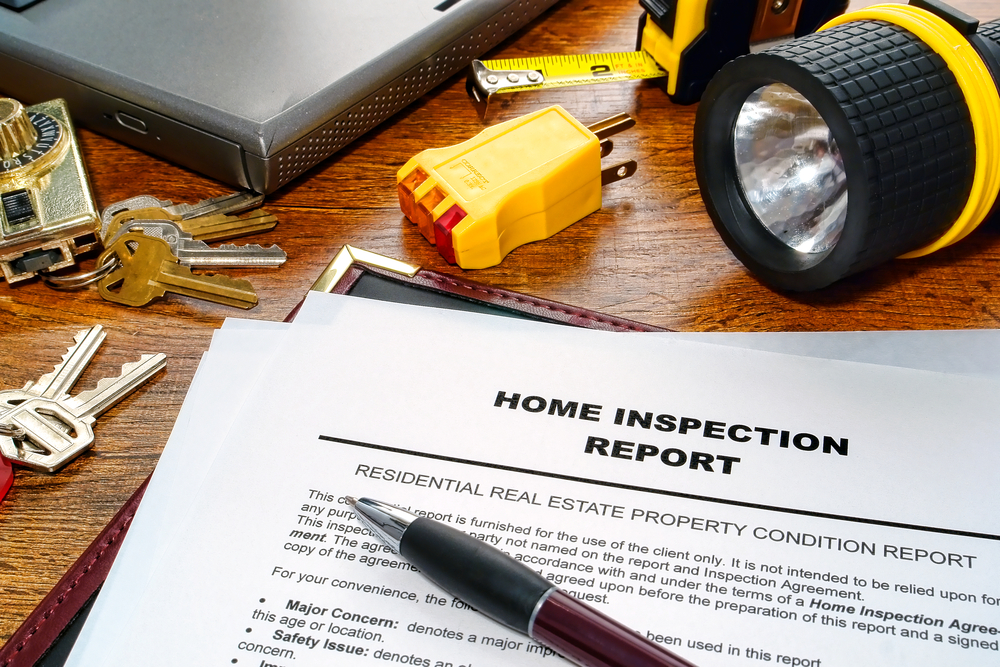
(A big “thank you” to our friends at Pillar to Post for sponsoring this post!)
Buying a home is probably the biggest purchase you will ever make. This means you need to take every precaution to ensure you’re making a wise investment. Unfortunately, some of the biggest issues that could pop up down the road aren’t apparent to an untrained eye. That’s why it’s important to invest in a home inspection before buying.
A certified professional home inspector will visually inspect the structure of your potential home. He or she will also check out major systems, such as plumbing and electrical components to find potential problems that may come up in the future. Then you and the home seller will receive a written report that contains a description of problems and recommendations for future evaluations. (If you’re planning to sell a home hiring a home inspector can also be a great idea. I did this with a home we sold last year and having already made all necessary repairs before putting the home on the market impressed buyers and helped the sale go through quickly.)
What Do Professional Insured Home Inspectors Check?
Requirements for home inspection differ by state. The organization American Society of Home Inspectors (ASHI) has a page dedicated to standards of practice. The society outlines the minimum requirements, as well as the uniform standards that you can expect from a professional home inspection.
Professional insured home inspectors look at a few things like:
- Structure issues, like the foundation, noting any sagging or window misalignment. They will also look for sagging in the foundation.
- Safety concerns, such as fire and carbon monoxide alarms, operational sprinkler systems, the condition of stairways, garage doors, hand and guardrails, and other safety areas are checked.
- Problems on the property such as septic tank leaks, drainage issues, the overall condition of the house’s exterior, driveways, fences, and sidewalks.
- The condition of the roof including the integrity of shingles, any areas in need to repair, proper venting, possible chimney damage, and clear gutters.
- Plumbing is inspected for any damage, such as leaking pipes and there should be proper hot water temperature, water pressure, working toilets, bathtubs, sinks, and showers.
- Electrical components need to be up to code, wiring is checked for condition, as well as circuit breakers, light fixtures, outlets, and fans.
Ensure you hire a professional insured home inspector that is attentive to the above essential components. To help you move into your home without problems, here are a few important qualities to look for in a potential home inspector.
Licenses and Credentials
You should always ask if the home inspector is licensed in the state where your potential dream home is located. Also check if the inspector is a member of a national organization like the ASHI. The ASHI requires inspectors to have at least 250 inspections before they receive a certification. Experience alone may not guarantee a good quality inspection, but it could be a way to determine if the inspector does the work full-time.
Insured Home Inspectors
It’s also important to make sure the home inspector is insured. If he or she doesn’t have insurance and there’s an accident during the inspection that results in an injury, you could be held liable. The inspector should also have professional liability insurance that covers anything they miss during the inspection.
Exceptional Reviews
Doing your research is important. You can ask your realtor to suggest a home inspector, but don’t simply rely on word of mouth. The most reliable recommendations usually come from previous customers, friends, and/or family that have used the inspector in the past. But always check the home inspectors reviews, ratings, and BBB score to get the best inspector for your potential dream home.
Professional Reports
After the inspection, you’ll get a detailed report with any problems listed. Instead of basing your opinion on the length of the report, look at how well the report was written. Having a summary, some photos, and a format that’s easy to read would be much better. Ask a potential home inspector to show you a sample report prior to hiring him or her. It is vital you fully understand the report, so it needs to be easy to read and digest.
Join The Inspection
Find a home inspector that will let you be on hand when the inspection is conducted. This will give the inspector an opportunity to share with you as any problems are found.
Asking questions is the best way of finding out whether the home inspector has your best interest in mind as well. You want a responsive home inspector that is open to questions explains issues in detail and breaks down everything in an easy to understand way.
Find Your Home Inspector Today
There is a lot that goes into buying a house. Not all of it is a hands-on endeavor, but when it comes to home inspections, you definitely need to be involved. Do your due diligence and hire a professional home inspector that you can work with. From structure to electrical, never close on a house contract until you’re convinced you have an accurate picture of any potential future problems.
Receive Stagetecture's Daily Lifestyle Ideas
FREE - Daily emails with recipes, home decor, D.I.Y, and lifestyle tips! : ) Who doesn't need help?






Leave a Reply